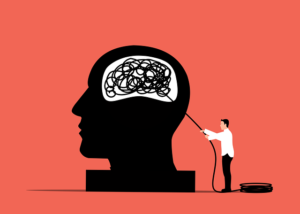Anxiety gets a bad rap. We’ve all had moments of sweaty palms, racing thoughts, and the overwhelming urge to crawl under a blanket and pretend the world doesn’t exist. But here’s the thing: anxiety isn’t just a nuisance; it’s a survival mechanism as old as time itself—like, literally, since cavemen were running from saber-toothed tigers (or mammoths, depending on your geographical flavor of prehistory). So, let’s dive into what anxiety really is, why it happens, and how to know when it’s time to call in some backup.
First off, let’s clear the air: anxiety isn’t inherently bad. In fact, it’s the reason you’re alive. Imagine our cave-dwelling ancestors lounging around the fire, oblivious to the lurking dangers. Without anxiety—that handy-dandy internal alarm system—they’d have been toast (or mammoth food). Anxiety revs up your body to either fight the threat, flee from it, or… well, freeze and hope it doesn’t notice you. This is the famed “fight-or-flight” response, and it’s been saving butts for thousands of years.
Here’s how it works. When your brain senses danger—real or imagined—it sends a distress signal to the amygdala, which is like the brain’s overzealous security guard. The amygdala doesn’t waste time asking questions; it flips the switch on your sympathetic nervous system. Suddenly, your heart starts pounding (to pump more blood to your muscles), your breathing quickens (to get more oxygen), and your digestive system takes a backseat (because who needs a snack when they’re about to wrestle a predator?).
All of this happens in the blink of an eye. It’s a beautiful, efficient system… when there’s an actual threat. But what happens when your brain starts ringing the alarm for, say, a presentation at work or an awkward family dinner? That’s when anxiety stops being your buddy and starts feeling more like an overbearing roommate who keeps setting off the fire alarm for burnt toast.
Here’s the tricky part: anxiety is a spectrum. On one end, you’ve got everyday worries that everyone experiences, like stressing over a test or wondering if you’ll say something embarrassing on a first date. On the other end, there’s clinical anxiety, which can feel like being stuck in fight-or-flight mode 24/7. It’s exhausting, overwhelming, and, for many people, debilitating. The key difference lies in how often anxiety shows up, how intense it is, and how much it interferes with your life.
For instance, let’s say you’re nervous about an upcoming job interview. You might feel a little jittery, maybe have a restless night or two, but you get through it. That’s anxiety doing its job: keeping you sharp and alert. But if you’re so paralyzed by worry that you can’t even bring yourself to apply for jobs, that’s anxiety overstaying its welcome. It’s like the mammoth has moved in, and now it’s sitting on your couch eating all your snacks.
The science behind anxiety disorders is complex, but it often boils down to a mix of genetics, brain chemistry, and life experiences. Some people are more predisposed to anxiety because of their family history, while others might develop it after a traumatic event. And let’s not forget the modern world’s delightful contributions, like social media, relentless emails, and a never-ending news cycle. It’s no wonder so many people feel like their brain is stuck in overdrive.
Now, let’s sprinkle in some good news: you don’t have to live at the mercy of your anxious thoughts. Understanding what’s happening in your body and mind is the first step to reclaiming control. When you feel anxiety creeping in, remember this: it’s your brain trying to protect you, even if it’s a little overzealous. Kind of like a friend who insists you bring a jacket when it’s 75 degrees outside.
The next step is learning how to calm your inner alarm system. Techniques like deep breathing, mindfulness, and progressive muscle relaxation can help. Deep breathing, for instance, signals to your brain that the “danger” has passed, which can slow your heart rate and help you relax. It’s like telling your overzealous security guard, “Hey, false alarm. Put the baton down.”
Of course, there’s no one-size-fits-all solution. For some people, therapy is a game-changer, particularly cognitive-behavioral therapy (CBT), which focuses on identifying and challenging the unhelpful thoughts that fuel anxiety. Others might benefit from medication, which can help balance the brain chemicals involved in anxiety. And let’s not forget the importance of a good support system, whether it’s friends, family, or a pet who doesn’t judge you for crying into your ice cream.
It’s also worth mentioning that anxiety doesn’t have to be a solo battle. If your anxiety feels like it’s running the show, reach out to a healthcare professional. They can help you figure out what’s going on and what steps to take next. There’s no shame in asking for help; it’s one of the bravest things you can do. Remember, even superheroes have sidekicks.
So, here’s the takeaway: anxiety isn’t your enemy. It’s a natural part of being human, a sign that your brain is working hard to keep you safe. But when it starts to interfere with your happiness, your relationships, or your ability to function, it’s time to address it. You’re not broken, weak, or failing—you’re just human, and humans weren’t built to face mammoths (or presentations, or deadlines) alone.
The next time you feel anxiety bubbling up, try to approach it with curiosity rather than fear. Ask yourself what your brain is trying to tell you, and then decide whether it’s something worth acting on. And if the mammoth ever feels too big to handle, don’t hesitate to call in reinforcements. You’ve got this.








